- Home
- Persia Woolley
Child of the Northern Spring (Guinevere Trilogy)
Child of the Northern Spring (Guinevere Trilogy) Read online
Copyright
Copyright © 2010 by Persia Woolley
Cover and internal design © 2010 by Sourcebooks, Inc.
Cover design by Susan Zucker
Cover images © The Princess Out of School (w/c on paper), Hughes, Edward Robert (1851–1914)/National Gallery of Victoria, Melbourne, Australia/The Bridgeman Art Library International; ANGELGILD, Maljuk, tomograf/iStockphoto.com
Sourcebooks and the colophon are registered trademarks of Sourcebooks, Inc.
All rights reserved. No part of this book may be reproduced in any form or by any electronic or mechanical means including information storage and retrieval systems—except in the case of brief quotations embodied in critical articles or reviews—without permission in writing from its publisher, Sourcebooks, Inc.
The characters and events portrayed in this book are fictitious or are used fictitiously. Any similarity to real persons, living or dead, is purely coincidental and not intended by the author.
Published by Sourcebooks Landmark, an imprint of Sourcebooks, Inc.
P.O. Box 4410, Naperville, Illinois 60567-4410
(630) 961-3900
Fax: (630) 961-2168
www.sourcebooks.com
Originally published in 1987 by Poseidon Press.
Library of Congress Cataloging-in-Publication Data
Woolley, Persia.
Child of the northern spring / by Persia Woolley.
p. cm. -- (Guinevere trilogy ; bk. 1)
1. Guinevere, Queen (Legendary character)--Fiction. 2. Knights and knighthood--Fiction. 3. Lancelot (Legendary character)--Fiction. 4. Queens--Great Britain--Fiction. I. Title.
PS3573.O68C4 2010
813’.54--dc22
2010027317
Table of Contents
Front Cover
Title Page
Copyright
Dedication
King Arthur's Britain
Cast of Characters
Author's Note
Chapter I
Chapter II
Chapter III
Chapter IV
Chapter V
Chapter VI
Chapter VII
Chapter VIII
Chapter IX
Chapter X
Chapter XI
Chapter XII
Chapter XIII
Chapter XIV
Chapter XV
Chapter XVI
Chapter XVII
Chapter XVIII
Chapter XIX
Chapter XX
Chapter XXI
Chapter XXII
Chapter XXIII
Chapter XXIV
Chapter XXV
Chapter XXVI
Chapter XXVII
Chapter XXVIII
Chapter XXIX
Chapter XXX
Chapter XXXI
Chapter XXXII
Chapter XXXIII
Chapter XXXIV
Chapter XXXV
Chapter XXXVI
Chapter XXXVII
Chapter XXXVIII
Chapter XXXIX
Chapter XXXX
Chapter XXXXI
Chapter XXXXII
Chapter XXXXIII
Chapter XXXXIV
Chapter XXXXV
Reading Group Guide
Possible Thematic Ideas for Guinevere Celebrations
An Overview of Arthur, Guinevere, and the Matter of Britain
About the Author
Back Cover
To Autumn and Sharon, John and Nick,
without whose support this story might not have been told,
and to Mama Dee,
without whom the teller would not have been
Cast of Characters
Guinevere’s Family
Leodegrance—King of Rheged
Guinevere—Leodegrance’s daughter
Cathbad the Druid—Gwen’s teacher
Edwen the Bard—Rheged’s harper
Gladys—cook for the household
Kaethi—albino medicine woman
Lavinia—Roman widow, Gwen’s governess
Llyn—Gwen’s childhood friend
Nidan—leader of Rheged’s warriors
Nonny—Guinevere’s nurse
Rhufon—master of the horse
Vida—in charge of spinning and weaving
The Irish Family
Brigit—Gwen’s Irish foster sister
Kevin—Gwen’s Irish foster brother
Angus—Brigit’s father
Sean—Brigit’s brother
Arthur’s Family
Sir Ector—Arthur’s foster father
Arthur—King Uther and Igraine’s son
Bedivere—Arthur’s foster brother
Cei—Sir Ector’s blood child
Drusilla—Arthur’s foster mother
Merlin—Archdruid and Arthur’s teacher
Major Leaders of Britain
Vortigern the Wolf—usurper of High Kingship
Ambrosius—Roman heir to High Kingship, Merlin’s father
Uther—Ambrosius’s brother, Arthur’s father
Gorlois—Duke of Cornwall, Igraine’s husband
Cador—Duke of Cornwall, Igraine’s stepson
Igraine—Duchess of Cornwall, Arthur’s mother
Morgan le Fey—Lady of the Lake
Morgause—King Lot’s wife
King Urien—Morgan’s husband, Arthur’s enemy
Uwain—Morgan and Urien’s son
King Lot of Lothian—Arthur’s enemy
Gawain—Lot and Morgause’s son, Arthur’s nephew
Various Nobles
King Ban of Benwick—Lancelot’s father
Maelgwn—King of North Wales, Gwen’s cousin
King Mark of Cornwall
Tristan—King Mark’s nephew
Dinadan—warrior, Tristan’s friend
King Pellam—Welsh king wounded by his own sword
Ulfin—Uther’s and then Arthur’s master of the wardrobe
Griflet—Ulfin’s son, master of the dogs
Other Characters
Agricola Longhand—Romanized Welsh noble
Balin and Balan—Celtic brothers
Bors of Brittany—Celtic warrior
Ettard—Igraine’s maid in waiting
Father Bridei—Christian hermit/monk
Frieda—Saxon girl with Griflet
Geraint—southern Welsh lord, Agricola’s friend
Nimue—priestess of Avebury’s Sanctuary
Theo—Visigoth sea commander and pirate
Palomides—young Arab boy with stirrups
Pellinore—warlord of the Wrekin
Lamorak—Pellinore’s son
Vivian—Lady of the Lake before Morgan
Irish Wolfhounds
Ailbe—Kevin’s favorite
Caesar—wedding gift to Arthur
Cabal—mate for Caesar
Author’s Note
There are few stories better loved or more often told than those which make up the legends of King Arthur. What began as the tales of a Dark Age warlord have gradually developed into one of the great story cycles of Western civilization, full of archetypal themes and personalities. Over the centuries it’s taken the form of folk history, morality story, grand romance, swashbuckling adventure, or high fantasy, generally reflecting both the social climate and the personal bias of the particular teller of the tale. This adaptability is part of its charm and probably one reason it has survived so long and well.
In recent years there has been a growing interest in looking behind myths of all kinds and retelling them in terms of human, rather than legendary, pers
pectives. This has led to some fascinating historical fiction, in which the cultures and climate of the times have a notable influence on the unfolding of the story.
I have made specific use of this technique throughout, but most especially in the development of Guinevere, who in the past has been presented too often as a two-dimensional character: either the shadow substance of a king’s ill-made choice or the willful and spoiled beauty who ruins the kingdom without compunction. (This approach to Arthur’s queen seems to perpetuate the Victorian view of her character and provides a handy scapegoat for authors who need one.)
The tales of Arthur’s remarkable kingdom grew out of the Celtic Renaissance which rose as the Roman civilization deteriorated and the Anglo-Saxons began their invasions. From the scattered clues found in modern archeological studies, ancient folklore and the writings of Gildas (the only contemporary author we have from that time), there appear to have been more elegance, diversity of trade, and education in the royal households of the Dark Age kings than was once thought.
Many of these Celtic kings were descended from the tribes who had resisted the coming of the Romans four hundred years before, and they rallied to oppose the Saxon invasions when the Empire crumbled. They were a rugged, wild, stormy lot, with a long tradition of queens who were co-rulers with their husbands. The activities of these vital and exciting women were recorded in both Celtic legend and Roman history, and any daughter of theirs was likely to be an independent and remarkable person in her own right. It is within this context that I have explored the background of Guinevere.
These pages won’t offer the dragons and jousts that Malory presented, but rather times of change and evolving thought, external threats to civilization as the Britons knew it, and internal bickerings such as even modern-day countries experience.
Like all other Arthurian tale-spinners, I owe an enormous debt to those who have told the story before, and to the various scholars who are engaged in serious pursuit of the Once and Future King. The specifics of Gwen’s childhood are largely my own invention, based on what I thought would explain her actions and behavior in the later story of her adult years. Cultures and ideas may change over the centuries, but the basic psyche of mankind evolves much more slowly. No doubt that’s why archetypal tales remain popular through the centuries.
It is easy to become very picky about language in a work such as this. For instance, would these people use slang? Can one use the term “lunch” or “book” when the word itself wasn’t invented for a number of centuries to come? If this principle is carried to its logical extreme, one couldn’t even use the Anglo-Saxon and French words which make up such a large body of our vocabulary, since technically they weren’t part of the Celtic tongue. In the end I decided that the purist should view this book as a translation; the characters themselves would have been speaking Brythonic or Latin or Goidelic anyway, and whether they called it lunch or the midday meal, book or tablet, the concept remains the same.
For ease of identification, I have generally used modern place names to denote specific locales, even though the name itself may be Anglo-Saxon. Where an earlier historical name indicates a political division more appropriately (such as the kingdom of Rheged), I’ve incorporated that. What we call Old Sarum I allowed the less ponderous name of Sarum simply because it was so much younger then.
The problem of the Welsh and the Cumbri is a bit stickier. The word “Cumbri” means “companions,” and it is the name by which the British Celts have referred to themselves down through the ages. When the barbarians finally overran Britain these people were driven into the mountains of the north and west, where they gave their names to such areas as Cambria and Cumberland. The victorious Anglo-Saxons referred to these regions as Wales and North Wales, meaning “the land of the strangers.” Thus, ironically, the natives found themselves branded as aliens by the newly arrived interlopers, a situation they thoroughly resented.
I’ve referred to the specific geographical area of Wales by its popular present-day name, but speak of the people as the Cumbri, in part to show the kinship between the various petty kingdoms and at the same time to indicate the extensive range of their holdings, which were far greater than modern Wales.
As to the spelling of personal names, they mostly follow the Malory version unless there is an equally well known Celtic form.
Since both legendary and historical characters run throughout the tale, I have occasionally opted for the historical reference as put forth by John Morris in his Age of Arthur. Theodoric is a real character, as are Urien, Gildas, Agricola Longhand, Cunedda, Maelgwn, and probably both King Mark and Tristan. One of the great delights of Arthurian study is the interweaving of the verifiable and the mythical, for each contributes a kind of magic far more lasting than simple spell-casting.
Because this is a work of fiction, I’ve presented things as colorfully as possible while still trying to stay within the pattern of thought or behavior that was probably prevalent.
When I began this project I had no idea it would involve so much research, or grow into a trilogy. Yet getting acquainted with the characters in this first book has been a wonderful experience, and I hope you, the audience, enjoy reading it as much as I have enjoyed writing it.
Mountain View, California
1981–1986
Chapter I
The Departure
I, Guinevere, Celtic Princess of Rheged and only child of King Leodegrance, woke to a clatter of activity in the stableyard. The sound of gruff orders and jingling harnesses was accompanied by swearing and grunting and the occasional stomp of a large, impatient hoof.
I scrambled out of bed and ran to the window. Sure enough, down by the barns the yard was filling with people and animals. Arthur’s men were strapping packframes on the ponies, and before long even the traveling horses would be saddled.
Too soon tomorrow had arrived, and a surge of panic rose up to choke me. It was all happening, whether I willed it or not, and I struggled to keep control of my destiny even while I searched for a way to change it.
“I can’t go…I can’t leave Rheged,” I’d cried defiantly last night, tugging on a pair of heavy breeches while Brigit stared at me dumbfounded, the unlit lamps forgotten in her shock at finding me half-dressed for flight.
“What do you mean you can’t?” Her voice was incredulous, and she tossed her head back defiantly, the red hair swirling like a shadow in the twilight gloom. “No Celtic queen whimpers she can’t face a challenge. Of course you can!”
Her words were more proud than angry, and for a moment she sounded so much like her cousin I could swear it was he speaking.
“That’s what Kevin used to say…” Tears leaped up behind my eyes, and I blinked fiercely to keep them back.
“And right he was, for once.” She relaxed then and came over to the bed, where I had piled the things I planned to take with me in my bid for freedom. “But that’s no cause to be talking of running away. You know no one survives in the forest; we’d be eaten by beasts, or caught by bandits and sold as slaves, or worse.” Her green eyes brimmed with terror, and she shivered suddenly and made the sign of the cross.
Her assumption that where I went, she went too was typical. At any other time I would have smiled at her loyalty, and I began to weaken in spite of myself.
“God forbid I let you do such a thing, Gwen. If you truly won’t accept this marriage, tell your father. You know he won’t force you to marry someone you don’t want, even if you are a princess.”
The hot tears of anger and frustration and heartbreak broke loose then, and Brigit gathered me in her arms and let me sob out my anguish against her stalwart shoulder. If we both remembered the other time I had cried thus, neither of us spoke of it. This night held enough pain without bringing back a grief that was best left peaceful in its grave.
When the first crest of my emotion had subsided, a hiccup caught me unaware, and fishing a handkerchief from her apron, Brigit handed it to me without a word. I dried m
y eyes and, turning to the window, stared out over the fort.
Like most Roman things, it was half in ruins; patched and mottled and left to decay. Usually I disliked such places, but here a double-storied tower had been set aside as “women’s quarters” after Lavinia joined the household. The top room had a fine view of the lake and fells, so whenever my father held court at Ambleside I settled in like a swallow returning to her favorite nest.
Tonight Windermere lay serenely sheened with silver, while above it a new moon hung misty in the pale sky. A fish sent ripples outward in silent beauty, and the little murmuring quacks of a mother duck calling her offspring drifted up to me. Somewhere in the village a child was trying to drive a noisy old hen into its coop for the night. It made me think of the one-eyed biddy who used to flap and squawk whenever I shooed her toward the roost at Patterdale, and the poignancy of so simple a memory threatened to bring back the tears I was trying to control.
“I think you’re suffering more from nerves than from a real dislike of Arthur,” Brigit suggested, calmly returning to the task of lamplighting. “Though I’ll admit, he certainly picked a forbidding emissary to come and fetch you.”
“Merlin?” I shivered a little at the thought of the distant, unbending magician. He had given no more than a curt nod when my father presented me, and throughout the evening meal had avoided so much as looking in my direction. Even in the past, on those rare occasions when he had visited our court during my childhood, he was always strange and aloof, reeking of the magic Archdruids are known to have. It was said he had made himself indispensable to the young High King, and if his attitude was an example of the welcome I would receive in Logres, I had good cause to regret the loss of my homeland.
In the end I promised Brigit not to run away, but to face my father on this morning. And the last thing I did before going to sleep was pray long and hard to Epona, begging the Horse Goddess for help in breaking the marriage contract without bringing dishonor to our family.
***

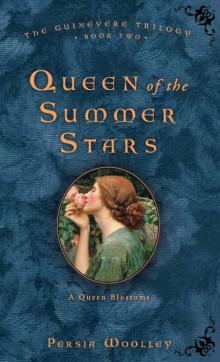 Queen of the Summer Stars: Book Two of the Guinevere Trilogy
Queen of the Summer Stars: Book Two of the Guinevere Trilogy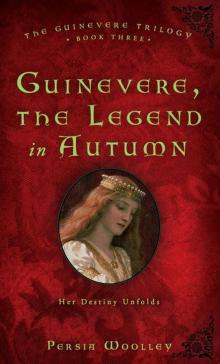 Guinevere, the Legend in Autumn: Book Three of the Guinevere Trilogy
Guinevere, the Legend in Autumn: Book Three of the Guinevere Trilogy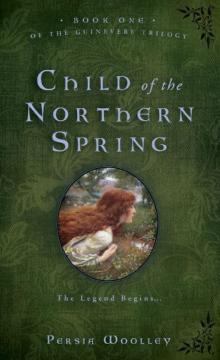 Child of the Northern Spring (Guinevere Trilogy)
Child of the Northern Spring (Guinevere Trilogy)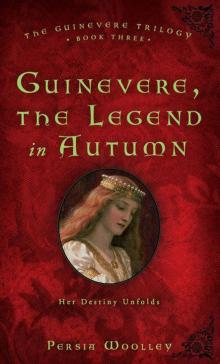 Guinevere: The Legend in Autumn
Guinevere: The Legend in Autumn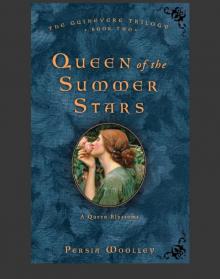 Queen of the Summer Stars
Queen of the Summer Stars